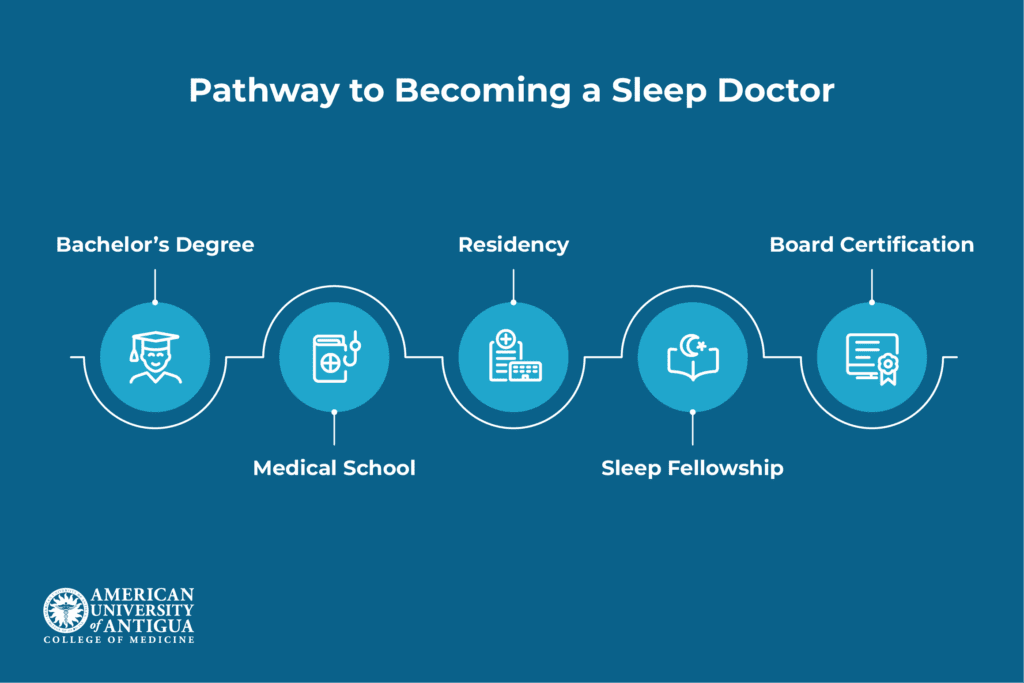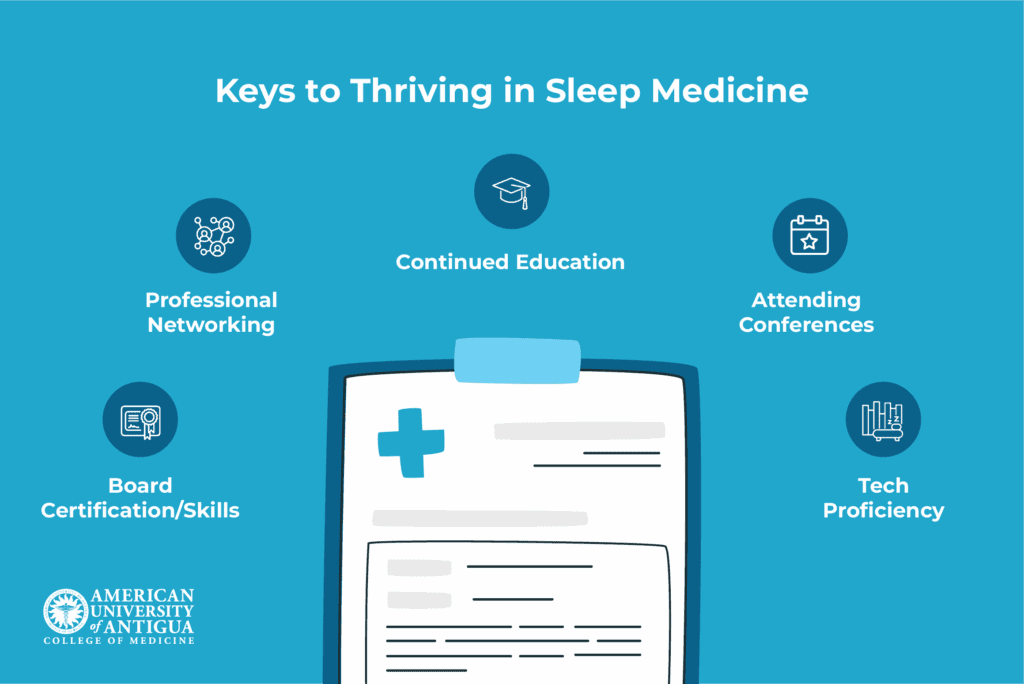How to Become a Sleep Doctor and Thrive in the Field
Key Takeaways
- Becoming a sleep doctor takes many years of education and training, including college, medical school, residency, fellowship, and board certification.
- Important qualities include attention to detail, patience, empathy, and strong problem-solving skills, along with the ability to interpret sleep tests and use sleep equipment.
- The field is growing fast due to increased awareness of sleep disorders, creating many job opportunities in hospitals, clinics, and academic settings.
- To be successful, one needs to work closely with other healthcare professionals, attend conferences, join professional groups, and pursue ongoing education.
Sleep medicine is rapidly gaining attention as a vital area of healthcare, thanks to growing awareness about the serious effects sleep disorders have on people’s lives. Millions of individuals experience sleep disorders such as sleep apnea and chronic insomnia, which often require medical attention and professional care.
A sleep doctor is essential in identifying and treating these conditions, assisting people in regaining their health via improved sleep. If you’re wondering how to become a sleep doctor and succeed in this important field, it’s essential to understand the prerequisites and the road to becoming a great sleep specialist. Read along to find out more.
✅ Request information on AUA's MD program TODAY!
How to Become a Sleep Doctor
Becoming a sleep doctor requires a significant investment of time, effort, and dedication. Years of education, real-world training, and practical experience are required before you can treat patients with sleep issues like insomnia or sleep apnea.
To become a sleep specialist, you must graduate from medical school, complete a residency program, complete a one-year sleep medicine fellowship, and obtain certification from a recognized medical board.

In the sections ahead, we’ll outline each step needed to pursue a successful career as a sleep doctor.
Earn a bachelor’s degree
Your journey to become a sleep doctor begins with earning a bachelor’s degree, most often in subjects like biology, chemistry, or psychology.
It’s important to choose a program that focuses on medicine and how the human body works since it will help you understand the basics needed for medical school. Taking courses in anatomy and physiology is especially helpful.
Besides studying, you should also try to engage in activities like volunteering, medical research, or shadowing doctors. These experiences will teach you more about medicine and strengthen your application for medical school.
Complete medical school
Medical school usually takes four years to finish and is divided into two main phases. During the first two years, students mostly learn in classrooms, covering subjects like anatomy, pharmacology, and disease pathology.
During the final two years, students complete clinical rotations, working directly with patients under supervision and gaining hands-on experience across various medical specialties.

For individuals interested in becoming sleep doctors, electives or rotations in specialties like neurology, psychiatry, or pulmonology are a smart choice because these disciplines offer valuable insight into the causes and care of sleep disorders.
Before going to medical school, students have to take the Medical College Admission Test (MCAT), which is an important exam used to decide if they’re ready for medical school. Completing medical school is a crucial step before beginning specialized training to become a sleep specialist.
Residency training
The next stage after graduating from medical school is to complete a residency program, which typically takes three to four years. Relevant specialties include internal medicine, neurology, psychiatry, pediatrics, and family medicine.
As they take on more and more responsibility for patient care throughout their residency, doctors gain crucial expertise in managing a range of medical conditions.
You can learn more about sleep-related disorders and better prepare for a career in sleep medicine by choosing a residency program with a reputable neurology or sleep medicine department.
Sleep medicine fellowship
Physicians who wish to specialize in sleep medicine after completing their residency usually complete a one-year fellowship. This advanced training focuses on diagnosing and providing treatment for sleep disorders, including narcolepsy, sleep apnea, and insomnia.
They also learn how to use devices like CPAP machines, which help individuals breathe better at night, and how to use specialized tests called polysomnography to monitor and analyze a person’s sleep patterns.
The Accreditation Council for Graduate Medical Education (ACGME) has accredited a large number of these fellowships, ensuring they meet high standards. Because many doctors want to train in sleep medicine, getting into a fellowship program can be very competitive.
Board certification
To become a fully qualified sleep doctor, it’s important to be board-certified in both your primary medical specialty — such as internal medicine, neurology, or psychiatry — and in sleep medicine itself.
Board certification serves as proof that a doctor has met high standards of knowledge and expertise in their medical field.
One of the main organizations that certifies doctors in both their main specialty and sleep medicine is the American Board of Medical Specialties (ABMS). To become certified, doctors have to pass detailed exams that check their understanding of medical science and their ability to diagnose and treat various sleep disorders.
After earning certification, doctors are expected to engage in ongoing education and pass recertification exams every few years to keep their credentials and stay up to date with advances in the field.
Tips to Succeed in Sleep Medicine
Having a successful career in sleep medicine means you need to keep learning and growing even after you finish your formal training. One effective way to stay updated and connected is by joining professional groups like the American Academy of Sleep Medicine (AASM). These groups provide valuable resources, training opportunities, and chances to enhance your skills.

Going to conferences and workshops is also important because you can learn about new research, treatments, and technology in sleep medicine. Meeting and working with other sleep doctors helps you find mentors, share ideas, and discover job opportunities.
It’s also important to keep taking courses to learn more and stay current in this evolving field. Being comfortable with technology, such as interpreting sleep study results and using devices like CPAP machines, is crucial for providing effective patient care. Staying curious, adaptable, and engaged will help you thrive as a sleep doctor throughout your career.
Skills and Traits for Success in Sleep Medicine
If you want to be a successful sleep doctor, you need a combination of both technical expertise and personal traits that will help you effectively treat patients with sleep problems. Key personal traits include:

- Attention to detail: It’s essential to closely examine a patient’s test results and medical history in order to truly understand their current condition.
- Empathy: Supporting patients who often face chronic sleep issues requires compassion and understanding.
- Patience: Diagnosing and treating sleep disorders usually takes time and careful work.
- Analytical thinking: The ability to interpret complex information is essential for accurate diagnosis.
- Problem-solving: Developing the best treatment plan tailored to each patient’s unique needs is critical.
Besides these personal traits, having strong technical skills is also necessary. This includes:
- Knowing how to interpret sleep studies (polysomnography) to diagnose sleep disorders.
- Operating and managing sleep equipment like CPAP machines and other devices that assist breathing or improve sleep quality.
Working in sleep medicine also involves collaborating closely with other healthcare professionals, such as pulmonologists (lung specialists), neurologists (brain and nerve specialists), and sleep technologists who conduct sleep studies. This teamwork is important to ensure patients get comprehensive care for all their sleep health needs.
Salary and Job Outlook for Sleep Medicine Doctors
Sleep medicine is a growing field with competitive salaries and steady job demand. In the U.S., the average annual salary for a sleep medicine doctor is around $301,206 but can vary widely depending on experience and location. Some hospital positions can pay up to $525,000 per year.
The demand for sleep specialists is increasing due to greater awareness of sleep disorders like sleep apnea and insomnia. However, there remains a significant shortage of trained physicians, with a patient-to-physician ratio of about 43,000 to 1.
Sleep doctors work in various settings, including hospitals, sleep clinics, private practices, and academic institutions, offering diverse career options. Overall, sleep medicine offers a promising career path with good pay and growing opportunities.
Conclusion
Becoming a sleep doctor involves several important steps: earning a bachelor’s degree, completing medical school, finishing residency training, undertaking a sleep medicine fellowship, and obtaining board certification. Sleep medicine is a growing and impactful field that significantly improves patients’ health by helping those with sleep disorders lead better lives.
If you’re passionate about healthcare and the science of sleep, the MD program at AUA offers a strong foundation for a successful career in sleep medicine.
Frequently Asked Questions
How long does it take to become a sleep doctor?
It typically takes about 12-14 years to become a sleep doctor, including undergraduate studies, medical school, residency, and a 1-year sleep medicine fellowship.
How much does a sleep practitioner earn?
Sleep medicine doctors in the U.S. earn an average of $301,206 annually, with some positions offering up to $525,000 depending on experience and location.
What credentials are required to become a sleep apnea specialist?
You need to be a board-certified physician in a primary specialty (like internal medicine, neurology, or psychiatry) and complete a sleep medicine fellowship followed by board certification in sleep medicine.
✅ Request information on AUA's MD program TODAY!